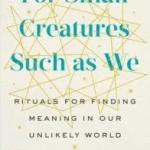 As we struggle through the dark days of the coronavirus pandemic, it will be helpful to remind ourselves that spiritual naturalists have many powerful resources for coping, surviving, and flourishing. First of all, we believe in the importance of truth, and truth-telling. We don’t spread rumors or tell lies. We check before we click. We know that honesty is the best policy for getting through any crisis and solving any problem.
As we struggle through the dark days of the coronavirus pandemic, it will be helpful to remind ourselves that spiritual naturalists have many powerful resources for coping, surviving, and flourishing. First of all, we believe in the importance of truth, and truth-telling. We don’t spread rumors or tell lies. We check before we click. We know that honesty is the best policy for getting through any crisis and solving any problem.
And this truth-telling extends to science. Science and technology are the best strategies for helping us defeat this virus. Already, many old drugs are being brought up to the front lines, new drugs are being developed, vaccines are in the works. We know that vaccines prevent disease and death. We honor the hard work of those medical professionals and others who are taking risks for our sakes. As naturalists, we place our faith, that is, our hope, in the power of reason and evidence.
But what about the spiritual part of spiritual naturalism? As naturalists, we don’t believe in the power of prayer or magic. Many atheistic naturalists will of course point out that the deities do not exist. A deeper point is that, even if they do exist, they will not help us. On this point, it’s interesting to turn back to ancient paganism. Consider ancient Roman thinkers like Plotinus, Iamblichus, Sallustius, and others. They argued that human actions have no effects at all on the gods and goddesses. Those deities exercise their powers in accordance with eternal plans – eternal algorithms – and their behaviors are not influenced by humans in any way. We cannot change the deities through prayers or sacrifices. The gods and goddesses do not exist for us; on the contrary, we exist for them. Religion, and spirituality, is about changing ourselves.
Spiritual naturalists have many techniques for changing ourselves. We can use meditation to calm our minds and bodies, and to help us gain clarity and focus. Stoic techniques are extremely useful in dark times. Remember: there are things you can control and things you cannot control. Focus on the things you can control, including your own attitude. All of us are mortal, and subject to disease, to injury, to aging. But we can control our attitudes towards those things, and we can choose to face them with courage and positivity. This is Stoic amor fati– love of fate.
Many Stoic ideas appear in naturalistic astrology. The stars and planets are useless for fortune-telling. But the great cycles of the heavenly bodies can help us gain distance and perspective. The earth still spins. For contemporary pagans, the wheel of the year still turns. The great cycles of nature will continue turning into the future, this crisis will pass, and we will be stronger. Do you remember the Athenian Plague? It was described in brutal detail by Thucydides. How about the Black Death? It carried away up to one half of Europeans. Or the plagues introduced by the Europeans who came to the Americas. Some estimate that over ninety percent of native American populations perished from new diseases. And there were countless other plagues through history. But humanity survived. Not only did we survive, we flourished. We are organisms with immune systems, finely tuned and highly powerful. We have fought with viruses through our entire evolutionary history – and we have always won.
As we struggle though these dark days, we need to focus on the future, and to focus on future success. How can we affirm that our futures will be bright? How can we orient ourselves to the best futures? How can we motivate ourselves to find the right paths through this maze? Practices of affirmation can help. Some pagans refer to these practices as magic – as spell-casting. Naturalists don’t think that magical spells have any effects beyond their psychological effects. They change our minds; by changing our minds, they change the world. Casting a spell is a way to refer to a class of possible ideal futures. It is a way to affirm that there are practical paths to those futures. A spell involves words which name possible ideal futures. Spells are practical, thus affirming that practical action can change the present into the future. And through the use of natural items like herbs, crystals, oils, and other props, spells construct models of possible futures. Spells are recipes – they are algorithms. Casting a spell is executing an algorithm. It affirms that nature is programmable – nature responds to symbols. It responds to the symbols in scientific theories. By casting a spell, you can affirm that you will find an algorithmic path to an optimal future. And naturalistic spell-casting, that is, naturalistic sign-craft, can provide you with ritual structure. Spell-casting is constructive. By casting a naturalistic spell, you symbolically construct a possible future.
But what about death? When it comes to death, don’t supernaturalists have an advantage over naturalists? Supernaturalists affirm life after death. Here’s some good news: naturalists can affirm life after death too. And not the shallow cliché that you live on in the memories of others. I mean real life after death. In fact, as I’ve argued in my book Your Digital Afterlives, naturalism has the best arguments for life after death. Life after death has nothing to do with the supernatural. Ancient pagan thinkers, from Plato through Plotinus and beyond, affirmed reincarnation. They were wrong about it. But none of them thought it was supernatural. For them, reincarnation just followed from the laws of nature. And your soul was just the information encoded in your body. Life after death is a topic in theoretical computer science. The meaningful parts of your life are just the information in your DNA, your nervous system, your body. Life after death follows from the principles of information theory. The afterlife is algorithmic.
What am I? I am a program running on a biological computer. When I die, my body will disintegrate. And my consciousness will stop. So what. When my computer crashes, its contents will be transferred to a new computer. So the bio-program that ran on my old body will run on a new body, in a new universe. But who will copy my old program into its new body? Nobody. The copying of information, at all scales, follows from natural laws. The wheel of the year, and the cycles of the heavenly bodies, symbolize the greatest cycle of nature: old universes beget new universes. And, just as genes get copied from old organisms to new organisms, so the programs in old universes get copied into the new universes. Of course, there are detailed arguments behind these sketchy claims. Believe them or not, it’s up to you. But the point remains: any naturalist who denies life after death really needs to think more deeply about nature.













